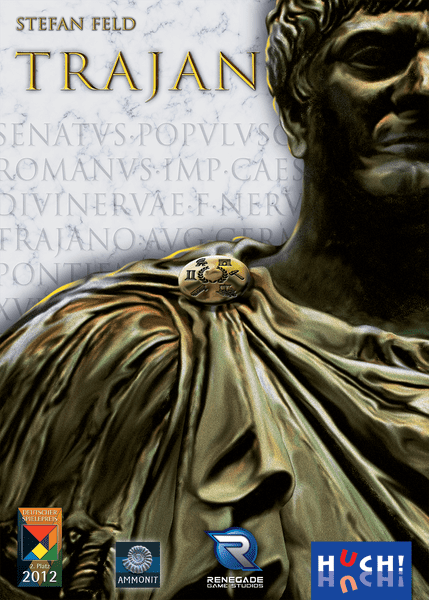Trajan (2011) Board Game
Trajan is a Euro-style board game designed by Stefan Feld and released in in 2011. It is set in ancient Rome during the reign of Emperor Trajan and focuses on politics, trade, and conquest. The game has received critical acclaim for its strategic depth and replay value.
Game Components of Trajan
How To Setup Trajan
To set up Trajan, players start by choosing a color and receiving their player board, wooden pieces, an Arch of Trajan, and Action markers. Each player places their Military leader and a worker into the military camp, a worker into the worker camp, a marker on the Senate track, and a marker on the score track. Players then receive a Bonus tile, three Trajan tiles, and three cards from the Commodity deck. The Action circle is seeded with twelve colored cylinders (six pairs of six different colors), and the Time marker is placed on the first space of the time track. A stack of shuffled Demand tiles is created, and the Resource card deck is shuffled and placed facedown with two face-up discard piles.
Gameplay Mechanics and Game Objective
Player Experience
Trajan offers a complex and engaging gameplay experience, requiring players to plan their moves carefully. The variable phase order mechanic, driven by the Mancala system, ensures each turn is unique and challenging. Players must balance multiple aspects of Roman life, from political influence to military expansion, to maximize their victory points. The game is highly strategic, with a high level of replayability due to the different strategies and random elements.
Pros
Cons
Personal Thoughts on Trajan
Trajan is ideal for players who enjoy complex, strategic board games with deep gameplay mechanics. It is perfect for those who appreciate games like Tzolk’in: The Mayan Calendar, Caylus, or Terraforming Mars. If you are looking for a game that challenges you to think ahead and manage multiple strategies simultaneously, Trajan is an excellent choice. However, it may not be the best fit for casual gamers or those seeking quick, light-hearted experiences.
We are supported by our audience. When you purchase through links on our site, we may earn an affiliate commission, at no extra cost for you. Learn more.

